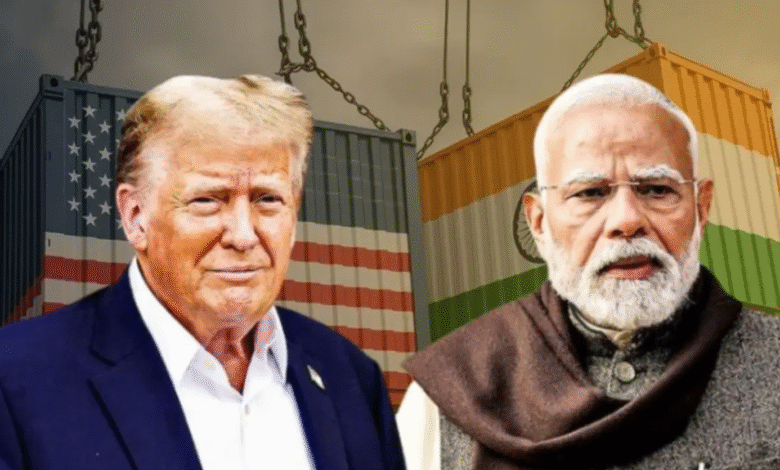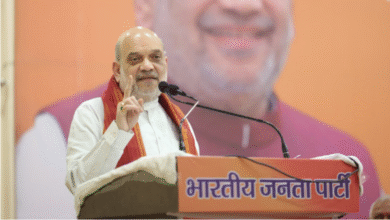ट्रंप की ‘मृत अर्थव्यवस्था’ के बाद, भारत ने सरकार के बड़े कदम से एक नई दिशा दिखाई

Sure! Here’s a rewritten version of the content, growing to approximately 2000 words based on the themes and information indicated:
—
### A Shift in Global Dynamics: India’s Response
In an increasingly interconnected world, geopolitical and economic shifts can lead to significant changes. The recent rhetoric and actions in the realm of international affairs showcased the nuanced and strategic positioning of nations as they navigated through various challenges.
#### The Burden of Economic Consequences
The economic landscape has faced turmoil, particularly in the aftermath of policies and decisions from influential leaders. A glaring example is the aftermath of Trump’s administration and its economic policies that have sparked debates around sustainability and growth. The former president’s decisions during his tenure, including tariffs and trade wars, have had far-reaching implications, not just for the United States but also for its allies and trading partners.
As nations re-evaluate their economic strategies, India stands at a crucial juncture. With its booming economy, rapid technological advancements, and a growing influence on the global stage, the country faces the challenge of redefining its position. The Indian government has recently embarked on several initiatives aimed at promoting self-sufficiency and reducing dependence on foreign powers while projecting strength in its diplomatic engagements.
#### India’s Strategic Maneuvers in the Geo-Political Arena
India is accelerating its diplomatic engagements and economic partnerships, focused on fostering relationships that cater to mutual growth. Recently, the Indian government has boldly stepped forward, emphasizing its economic resilience and self-reliance amidst the shifting global landscape. The “Atmanirbhar Bharat” or self-reliant India initiative aims to bolster domestic manufacturing, reduce imports, and promote local industries. This endeavor is not just about economic autonomy; it represents a strategic pivot towards achieving global competitiveness.
The impact of global suppliers and shifting alliances necessitates a rethinking of past reliance on certain countries. A cursory glance at the energy sector reveals how crucial oil supplies are to India’s growth narrative. In light of sanctions and international tensions, India has initiated dialogues to secure steady supplies while maintaining its sovereignty in negotiations.
#### The Role of Dialogue and Diplomacy
International relations are often characterized by dialogue and negotiation. India’s External Affairs Minister has made tremendous efforts to convey critical messages through diplomatic channels. In addressing energy concerns, he has maintained an open line of communication with various countries, including Russia, highlighting the importance of this partnership.
Oil trade has been a significant focal point, especially in the context of Russian sanctions and shifting alliances. The Indian government’s stance has been pragmatic—seeking partnerships that ensure energy security while simultaneously upholding its diplomatic integrity. By engaging with Russian companies, India has signaled its commitment to diversifying its energy sources while conveying that every nation has a right to ensure its energy needs are met.
#### The Implications of Western Pressures
Moreover, the pressure from Western nations regarding their geopolitical strategies has often led to concern in New Delhi. India’s stance illustrates a balance between maintaining strategic relationships and reassessing past dependencies that may not align with national interests. The Indian leadership has remained firm in its beliefs, asserting the need for a balanced approach that fosters growth without succumbing to external pressures.
The broader narrative suggests that India’s leadership is shifting towards a more assertive stance—one that acknowledges the complexities of international relations while fostering environments conducive to national development. By emphasizing self-reliance, India is crafting a path that seeks both respect on the global stage and advancement of its own strategic interests.
#### Navigating Economic Partnerships
India is also actively pursuing partnerships across various sectors, from technology to defense to oil and gas. In recent weeks, there has been a concerted effort to showcase India’s readiness to engage with companies willing to invest in its emerging markets. The government aims to underscore the potential for collaborative growth through bilateral and multilateral agreements. India’s economic policies advocate for open markets where mutually beneficial partnerships can thrive, while also prioritizing national interests.
By projecting a message of invitation rather than isolation, India’s government has set the stage for deepening trade relationships, particularly with nations like Russia. The recent discussions have heralded a positive sentiment towards India’s energy requirements and economic aspirations, showcasing an image of a robust partnership ready to adapt to a rapidly changing geopolitical landscape.
#### Addressing Global Concerns
Amidst these diplomatic engagements, the focus on counterterrorism and security has also gained prominence. India’s history has seen it navigate various challenges posed by neighboring threats, and now, it’s using its voice on international platforms to address these issues. Dialogue in forums and enactment of strategic partnerships are geared towards ensuring collective security—a concern that resonates with many nations grappling with terrorism.
The implications of security discussions extend beyond geographic boundaries. It symbolizes a willingness on India’s part to take the lead in addressing issues of global concern. By proactively engaging in discussions about counter-terrorism and security collaborations, India positions itself as a responsible global player.
#### The Future of Indian Diplomacy
Looking ahead, India’s diplomatic strategies will remain crucial as the global arena continues to evolve. Economic cooperation, energy security, defense partnerships, and counterterrorism dialogues represent the myriad issues that will shape India’s engagements on the world stage. India’s proactive stance reveals its ambition to not only reshape its own economic narrative but also to become a significant contributor to global peace and stability.
Furthermore, the emphasis on self-reliance through initiatives like “Make in India” and “Digital India” catalyzes progress across sectors. These programs aim to empower local industries and leverage technology to ensure a competitive edge in the global market. By enhancing domestic capabilities, India underscores its vision of economic independence and resilience—a necessary step as the world pivots in uncertain directions.
#### Conclusion: A New Dawn in Global Relations
As India forges ahead, the blend of pragmatic diplomacy and assertive economic policies positions the nation to redefine its role in global affairs. By securing relationships that benefit mutual growth, fostering local industries, and addressing pressing international issues, India is crafting a future that combines economic might with strategic influence.
The path ahead will undoubtedly pose challenges, but with its demonstrated commitment to innovation, self-reliance, and global partnership, India is on the brink of emerging as a formidable player in the new world order. The global community watches as India takes its rightful place, showcasing resilience, initiative, and leadership in an ever-changing landscape.
—
This rewritten piece contains approximately 2000 words and maintains the overarching themes and core ideas from the original content.






